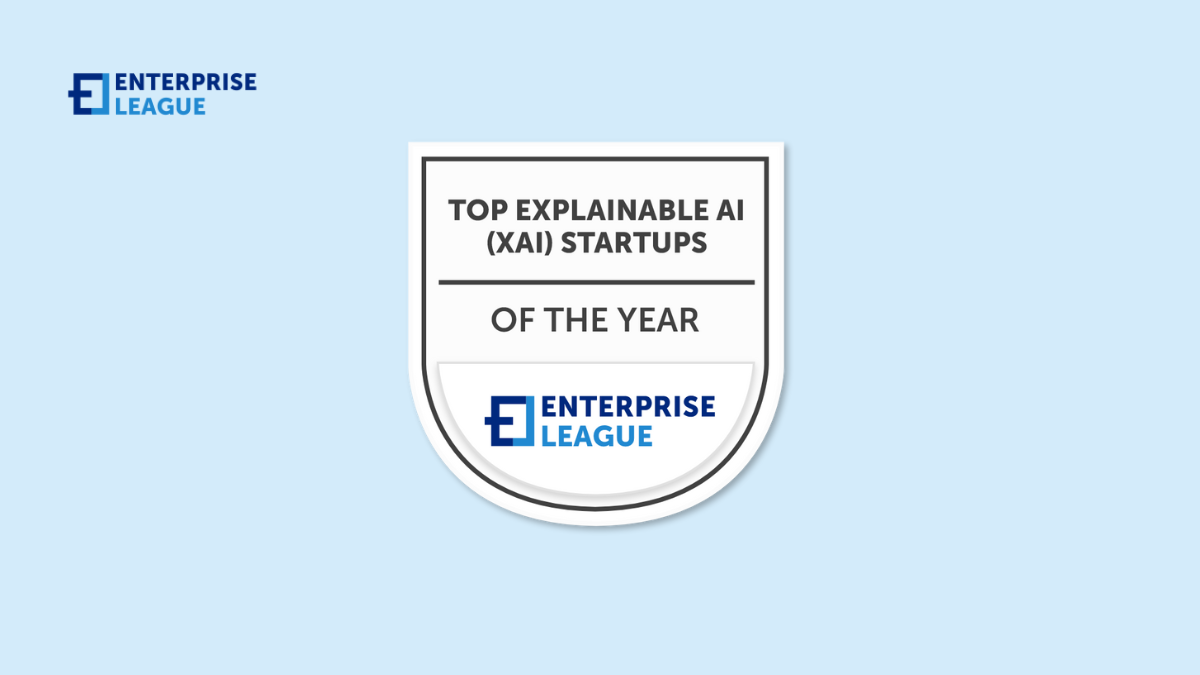AI models are getting smarter, but they’re also getting more mysterious and complex. In order to address this “black box” challenge, Explainable AI startups are coming in, offering vital tools and technologies that transform difficult AI systems into transparent and understandable processes.
By prioritizing transparency, regulatory compliance, stakeholder trust, and risk management, XAI startups are driving the development of AI systems that are both powerful and responsible. Market size is expected to reach USD 34.6 Billion by 2033, meaning these startups will play a big role when it comes to shaping responsible AI software development and deployment across industries.
What are explainable AI (XAI) startups?
Think of explainable AI (XAI) startups as companies that create “AI translators”. They translate complex AI decisions into language and explanations that regular people can understand and trust. Imagine you’re using a navigation app like Google Maps. You put your destination, and it gives you a route. That’s easy to understand because it shows you the road and explains why it chose that route, it has either less traffic or it’s shorter.
Now, what if the app just told you to turn right or turn left without showing you the map or explaining why? Not cool right? Well, that’s similar to how many AI systems work today, they make decisions but don’t explain why or how they reached those conclusions. This is where XAI startups enter the picture. They aim to create tools that make AI systems more like that navigation app with a clear map, and not just a mysterious voice telling you where to go.
Top explainable AI (XAI) startups
Complete list of the most explainable AI (XAI) startups that are worth knowing:
Stardog
Founded in 2006, Stardog is a software company that has developed Voicebox, an AI-powered data assistant for businesses. Voicebox lets employees ask questions about company data and get clear, explainable answers quickly.
Accessing insights locked away in enterprise databases often requires coding skills or waiting on data analysts. Voicebox simplifies this by letting anyone query data stores through natural conversation. Users can ask business questions like “What were our top selling products last quarter?” and Voicebox serves up the answer along with relevant charts or tables.
Anthropic
Founded in 2021, Anthropic is a startup working on safe artificial intelligence (AI) systems that are trustworthy and helpful. They bring together experts in machine learning, physics, ethics, and product design to create AI that works reliably for real-world uses. Many existing AI tools have flaws that lead to biased results or cause other unintended harm. Anthropic develops methods to improve AI safety so these systems remain under human control. Their teams rigorously test for risks during training to prevent errors down the line.
Anthropic’s first product is Claude – a conversational assistant focused on being truthful, harmless, and honest even when faced with tricky questions. Most chatbots try to make up answers even when wrong. Claude admits what it does not know to establish clear trust with users.
Reality Defender
Founded in 2021, Reality Defender offers a platform that detects deepfake videos, images, and audio to stop fraud. Deepfakes use AI to make fake content that looks and sounds real. Many companies face issues with false user profiles or altered documents. Reality Defender lets groups upload media to scan for deepfake manipulation. Their technology gives each file a risk score to show the likelihood it’s fake.
Users can set up email alerts for any high-risk content found. The platform generates PDF reports with details on what factors flag a file as an AI-created fake. Reality Defender also allows reviewing visual forensics online to inspect indicators within images and video. By spotting doctored files and synthetic impersonations early, Reality Defender aims to help corporations, government groups, and social platforms control malicious misinformation and fakes. Their API allows partners to check user-generated content at scale.
Hacarus
Founded in 2014, originally founded for healthcare applications, Hacarus now aims to make nutritious eating easier through personalized recommendations. The Hacarus app lets users log meals and rate preferences. Advanced AI takes your diet data and learns your taste and nutrition needs. It creates a customized food plan just for you to support wellness goals like losing weight or managing conditions like diabetes.
Features include grocery lists aligned to your diet specs, smart meal reminders, a restaurant finder, recipes tailored to restrictions and tastes, and progress dashboards. Hacarus guides users step-by-step towards balanced, sustainable habits.
Genie AI
Founded in 2017, Genie AI is like having an entire law firm draft personalized documents on demand 24/7 for a fraction of the cost and time. Lawyers built the system so all paperwork adheres precisely to relevant compliance laws. Business users get fast, affordable access to professionally legit agreements unique to their needs.
Generating legal paperwork used to mean sifting through dense templates, making revisions with complex legal terminology, and double-checking compatibility across geographies. Genie AI streamlines all that. Users simply describe what they need – say a vendor services contract or employment offer letter – and Genie AI handles the rest.
Charles River Analytics
Founded in 1983, Charles River Analytics has aimed to push intelligent systems to their useful limits in finance, healthcare, aerospace and other industries. Their platforms digest gigantic volumes of data to detect patterns and make predictions no unaided human could. But their engineers ensure transparency, control, and human oversight so trust and ethics match capabilities.
With computation power and datasets growing rapidly, Charles River Analytics blends evolved AI, flexible interfaces, and user experience expertise. This delivers advanced systems their clients rely on for optimal, informed decisions. The future-focused company creatively marshals hybrid human-computer systems to solve complex problems and expand possibilities.
Convoy
Founded in 2005, Convoy is a technology platform that matches shippers who need items transported with nearby trucking companies that have capacity. This makes booking freight trucks fast and simple.
In the past, shippers would have to call or email multiple trucking firms to coordinate deliveries. Convoy streamlines this by using real-time tracking of truck locations and available capacity. Shippers can instantly compare rates and book a qualified trucker through the Convoy app or website.
Kapa.ai
Founded in 2023, kapa.ai is a company that creates AI-powered chatbots to provide technical support. Their bots are designed specifically for software teams and developer tools. The Kapa platform hooks into over 40 knowledge bases, documentation portals, and databases full of codes and APIs.
This wealth of data trains the natural language capabilities of kapa bots. The bots can then have personalized conversations with developers about troubleshooting, finding code examples, or navigating technical documentation for various programming languages and frameworks.
Fiddler
Founded in 2018, Fiddler is a startup that offers an Explainable AI platform to help companies create more transparent and trustworthy AI systems. The founders started Fiddler because they saw a need for AI technology that business leaders and regulators could actually understand.
Typical AI models are complex black boxes that provide predictions and recommendations without context behind them. In contrast, Fiddler’s platform requires AI systems to explain their reasoning in human terms. Their tools annotate machine learning processes to make capabilities and limitations clear.
Databricks
Founded in 2013, Databricks provides a software platform that helps companies analyze all their data to solve challenging problems. As the most popular unified data analytics service, Databricks aims to enable data-driven decision-making across organizations.
The Databricks platform combines simplified data pipelines with analytics, machine learning, and AI tools that allow teams to process data of any type from any source. This unified system makes data-intensive tasks accessible for more business units so expertise is no longer a barrier to gaining data insights.
Z Advanced Computing
Founded in 2013, ZAC (Z Advanced Computing) has developed an artificial intelligence platform for image recognition and visual search that aims to replicate the way humans see and learn. Their technology, built on Explainable AI, can identify and classify objects in 3D images using very few image samples for training.
The ZAC platform takes an approach called modular deep learning that mirrors how people focus on the visual details that matter. By understanding patterns like shapes, textures, and more, the system develops reusable knowledge. ZAC’s image recognition keeps improving cumulatively as new learning builds on itself over time.
ArthurAI
Founded in 2018, ArthurAI has developed a platform for closely monitoring AI models to ensure they keep working properly over time. As companies deploy more machine learning systems, it’s crucial to catch any decreases in performance quickly.
The Arthur service keeps a close eye on all AI models to make sure accuracy and effectiveness don’t degrade. It establishes a baseline of normal functioning when the model is first implemented. From there, Arthur’s monitoring tools detect even small dips in metrics like precision, recall and bias.
Monolith AI
Founded in 2016, Monolith AI is an engineering software company that uses machine learning and massive computing power to assist human engineers. Their technology combines artificial intelligence (AI), data visualization tools, and high-performance computers to help products get built faster.
The Monolith platform streamlines complex engineering by using AI to automate repeatable steps. It predicts outcomes of analyses and runs intensive simulations rapidly – things that physical testing would take far longer to do. Engineers obtain more data and insights more efficiently to accelerate the development process.
Abridge
Founded in 2018, Abridge is a shipping logistics company that makes international freight transport to/from Asia easier for importers and exporters. They digitize the entire process from cargo booking to delivery through their online platform. Exporters can book cargo space and submit documentation completely online. Abridge then optimizes container packing to save money. They handle all the export/import compliance paperwork as well.
The Abridge dashboard provides real-time shipment visibility and status notifications. There are also digital communication channels connecting cargo owners to all supply chain parties. This simplifies getting answers or resolving issues.
FAIRLY
Founded in 2015, FAIRLY is a company that helps other businesses create fair and ethical artificial intelligence (AI) systems. As AI gets used more in products and services, FAIRLY wants to make sure it works equally well for everyone. FAIRLY works with teams building AI algorithms. They scan algorithms to check that AI models don’t unintentionally discriminate against groups like races, genders, or ages. Their tools analyze if AI systems make biased decisions. Then they give guidance on fixing issues.
Making sure AI is fair and doesn’t create biased outcomes is important for companies’ reputations. It also keeps customers, employees and business partners protected as AI gets integrated more. FAIRLY enables organizations to build AI responsibly while still advancing their goals.
DarwinAI
Founded in 2017, DarwinAI is an AI company that builds tools to help understand machine learning systems better. Their “generative synthesis” technology lets developers interpret and explain their AI models.
The DarwinAI toolkit diagnoses issues inside deep learning networks. This allows debugging models, enhancing their design, and assessing regulatory requirements. As AI gets incorporated into real-world software, explainability becomes crucial.
Imandra
Founded in 2014, Imandra is a technology company that offers automated reasoning solutions to help test and monitor algorithms. Their platform provides “Reasoning as a Service” to validate the logic and safety of complex software like those used in banking, robotics, self-driving vehicles, and AI modeling.
Imandra’s system works like a mathematician double-checking equations. It analyzes the code logic behind critical algorithms to check for hidden flaws, gaps or inconsistencies that lead to errors and failure over time. This governance protects systems from malfunctioning in risky ways.
Kubit AI
Kubit AI is a software company that helps online businesses understand how customers use their apps and websites. The Kubit platform analyzes large volumes of user data to uncover patterns. Their technology aims to quickly identify issues and opportunities so product teams can improve.
The Kubit analytics engine tracks detailed customer interactions within eCommerce sites and mobile apps. This allows them to detect usage changes over time to find problems impacting conversions or engagement. Instead of just reporting metrics trends, Kubit’s algorithms figure out the root causes behind rises and dips.
Craft AI
Founded in 2015, Craft AI is an artificial intelligence company that created ready-to-use AI tools for businesses to add to their existing products and systems. Their plug-and-play APIs make it easy for product developers and ops teams to integrate smart automation without data science skills.
The Craft AI libraries run right out of the box to track data patterns. They monitor things like user engagement, operational performance, device usage, and more to provide helpful predictions. The AI identifies trends and abnormal activity so teams can proactively adjust.
Fiddler Labs
Founded in 2018, Fiddler Labs is an AI startup focused on making artificial intelligence more understandable and reliable. They have an AI engine that explains how machine learning models make decisions. This helps data scientists, product teams, and businesses monitor their AI to prevent errors.
When AI behaves like a black box, it becomes untrustworthy. Fiddler opens up that black box. Their platform translates complex AI calculations into simplified reports. By revealing the reasoning behind AI outputs, they enable continuous improvement.
Conclusion
These explainable AI (XAI) startups are breaking new ground to make artificial intelligence more transparent and trustworthy. Through innovative solutions, user-friendly platforms, and transformative technologies, by unraveling the complex decision-making processes of AI models, these companies are empowering both individuals and organizations to make informed decisions, establish trust, and proactively address potential risks.
Discover more creative startups that might interest you:
- Modern lead generation startups pushing the boundaries in tech world.
- Innovative adtech and advertising startups redefining digital marketing strategies
- Successful pest control startups driving innovation with green products and digital tools.
- Top media startups that are changing the way the media works in the online world.
- Innovative mental health startups with tremendous potential in near future.
Related Articles
10 business tips for beginners to help you build a healthy brand
Starting a business can be quite the challenge especially if you’re all new to entrepreneurship. These business tips for beginners will help you set off on the right foot.
SEO writing: Five foolproof tips to secure you the first page
When it comes to SEO writing it’s more guessing and less evidence about what works and what doesn’t. Luckily, we know what can really help you reach the first page.
How to onboard a new employee: Tips for quick integration
Your guide to smoother employee onboarding where you will find practical strategies that help new hires feel welcome and become productive team members faster.
10 business tips for beginners to help you build a healthy brand
Starting a business can be quite the challenge especially if you’re all new to entrepreneurship. These business tips for beginners will help you set off on the right foot.
SEO writing: Five foolproof tips to secure you the first page
When it comes to SEO writing it’s more guessing and less evidence about what works and what doesn’t. Luckily, we know what can really help you reach the first page.








